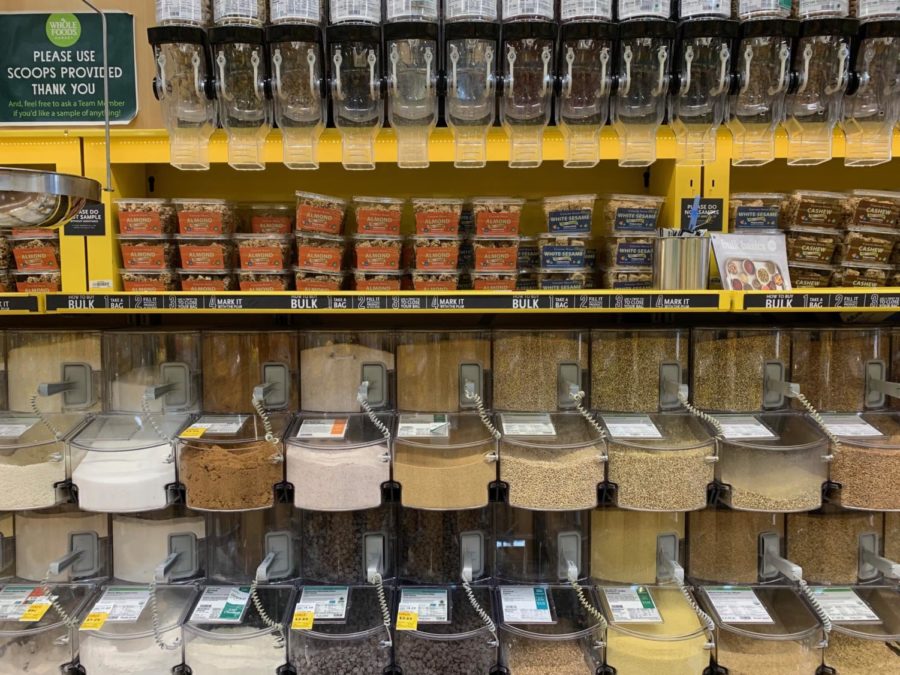How “Zero-Waste” is Doing More with Less
For activists of the zero-waste movement, plastic straws are so last season. The zero-waste movement has grown rapidly, and as of 2019, its forces now conquer areas all across the globe, armed with muslin produce bags, metal straws and compost bins.
With prevalence of plastic waste and damaging environmental effects of the material’s longevity, followers of the zero-waste lifestyle have sprung up to advocate for reduced consumption of single-use products and packaging and to encourage purchasing sustainably-sourced goods.
Zero-waste has even expanded onto campus. Alongside teaching tenth grade and advising the Environmentalist Club, chemistry teacher Brittney Kang has become a full-time participant since last year’s Earth Day.
“I wanted to make a bigger leap than just telling students that climate change exists,” Kang said.
In listing out all of her daily routines, rituals and rules to live by, Kang’s adaptation to the zero-waste lifestyle seemed effortless. In reality, implementing these new habits brought unexpected challenges to her everyday life.
“I had to remind myself to take it slow,” Kang said. “I tried making my own different things. Sometimes it works, sometimes it doesn’t. I tried to make mascara, and that didn’t go well. There were days where I would go to the store, and I’d be like ‘Oh! I forgot my straw.’ Or days where I would forget to tell them not to give me [a plastic] one.”
Still, her struggles only reinforce her passion for the movement’s purpose.
“It’s good not to beat yourself up over it because [zero-waste] is such a new concept, and it’s such a foreign idea in America that not everything is instant,” Kang said. “It’s okay to make mistakes, and it’s okay to forget sometimes. Every day, you have another day to make less waste and to be better.”
Social media plays a large role in intensifying this desire to ditch disposable items, and sophomore Vincent Nghiem lives with an example every day. His mother, Ann Le, Anneorshine on YouTube, is one of the social media influencers spreading awareness and guiding novices on how to take on the unfamiliar terrain.
In her video, “Minimalist Life | Reduce Waste D.I.Y. + Tips,” Le discusses the fundamental concepts to simplifying her life, accompanied by instructions on how to recycle, reduce, reuse and repurpose.
“When you want to live a more quality lifestyle, you definitely have to be more conscious of your environment and everything else around you,” Le said in the video. “It all starts with our actions and trying to do something about it. Trying is better than not doing anything at all, right?”
Although awareness of the issue continues to dominate the world through social media, not all lives can accommodate the commitment and philosophies of zero-waste.
“Learning trumps zero-waste for me right now,” Kang said. “I want my students to be able to learn, so if they’re gonna learn better when I print things out, then I’ll print it out.”
While the entirety of campus may not be zero-waste, the school makes a consistent effort to be more environmentally conscious, like with its implementation of recycling bins just two years ago.
“There used to be only trash cans, so people only threw everything away in the trash,” ASB service project commissioner and junior Ava Fakharpour said. “The staff has really tried to encourage putting plastic in the correct places, and students are doing a good job of listening.”
Zero-waste may be a distant goal for Portola High, but taking small steps and giving full commitment is essential to progress toward a healthier environment.
Your donation will support the student journalists of Portola High School. Your contribution will allow us to purchase equipment and cover our annual website hosting costs.

Kelthie Truong is a Co-Managing Editor for the 2020-21 school year, her second and final year with the Pilot. When she’s not in the newsroom, you can...




